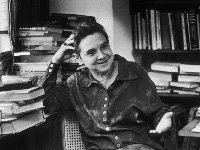Tribute to Adrienne Rich

Adrienne Rich - poet, essayist, and activist - was born in Baltimore, Maryland in 1929. Her nascent interest in poetry and literature was supported first by her parents, then by her instructors at Roland Park Country School. She attended Radcliffe College, focusing primarily on poetry and writing craft; in her last year of college, her first poetry collection, A Change of World (1951), was chosen for the Yale Series of Younger Poets Award by W.H. Auden. Following her graduation, Rich spent a year in Europe on a Guggenheim Fellowship.
In 1953, Rich married Alfred Haskell Conrad, with whom she had three children during the 1950s; she later wrote in her 1982 essay "Split at the Root: An Essay on Jewish Identity", that "The experience of motherhood was eventually to radicalize me." In 1966, Rich and her family moved to New York, where she became involved in the New Left and anti-war, civil rights, and feminist activism. From 1967 to 1969, she taught at Swarthmore College and Columbia University, as well as in the SEEK Program in City College of New York, from 1968 to 1975.
In 1974, Rich received the National Book Award for Poetry in 1974, which she accepted alongside Alice Walker and Audre Lorde, who had also been nominated for the award, on behalf of all women “whose voice have gone and still go unheard.” It was around this time that Rich moved out of the apartment she shared with Conrad, and in 1976, she entered into a partnership with Michelle Cliff.
The collections of poems Rich published in the late seventies and early eighties - Twenty-One Love Poems (1977), Dream of A Common Language(1978), and A Wild Patience Has Taken Me This Far (1981) - explored lesbian desire and sexuality through personal as well as political lens. During this time, Rich also wrote a number of socio-poltical essays, including "Compulsory Heterosexuality and Lesbian Existence" (1980), which was reprinted in her 1986 book, Blood, Bread, and Poetry: Selected Prose 1979-1985.
In 1979, Rich and Cliff moved from New York to Montague, MA and then to Santa Cruz, CA, where Rich continued to work as a professor (teaching at UC Santa Cruz, Scripps College, San Jose State University, and Stanford University) while also publishing poetry and essays. Together, Rich and Cliff, took over as editors for Sinister Wisdom in 1981, a position they held until 1983.
In June 1984, Rich presented a speech at the International Conference of Women, Feminist Identity, and Society in Utrecht, Netherlands, and in 1990, Rich continued her work with periodicals by participating in the founding of Bridges: A Journal for Jewish Feminists and Our Friends and serving as its editor. In the following years, she also joined advisory boards for groups such as the Boston Woman's Fund, National Writers Union and Sisterhood in Support of Sisters in South Africa.
Despite Rich’s radical politics, her poetry continued continued to receive mainstream praise and recognition. In 1994, Rich won the MacArthur “Genius Grant”; and in 1997 Rich was awarded the National Medal of Arts, which she declined in protest, stating that, “[Art] means nothing if it simply decorates the dinner table of the power which holds it hostage".
Rich continued to publish both poetry and essays through the late nineties and early 2000s, and returned to anti-war activism in 2001, to protest the Iraq war. In October 2006, Equality Forum honored Rich's work, featuring her as an icon of LGBT history.
Rich passed away on March 27, 2012, at the age of 82 from her long-term rheumatoid arthritis in the Santa Cruz, California home she shared with her partner Cliff.
Read the Tribute issue of Sinister Wisdom to Adrienne Rich here.
"Empowerment comes from ideas."
― Charlene Carruthers
"Your silence will not protect you."
— Tourmaline
"Gender is the poetry each of us makes out of the language we are taught."
— Leila Raven


